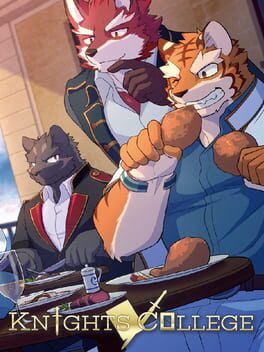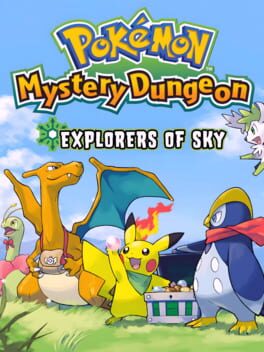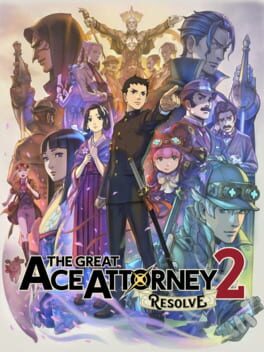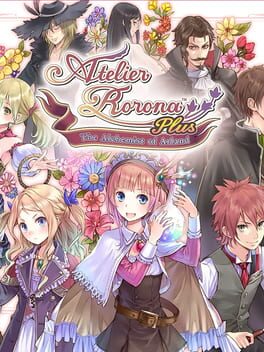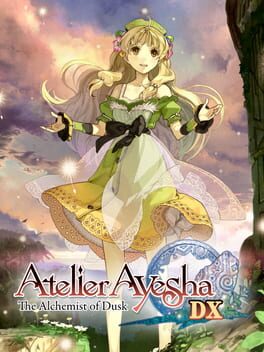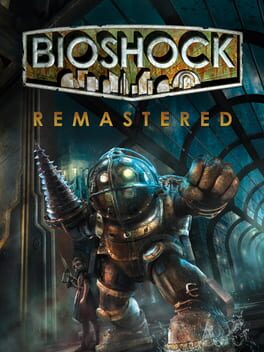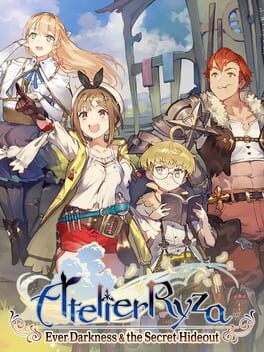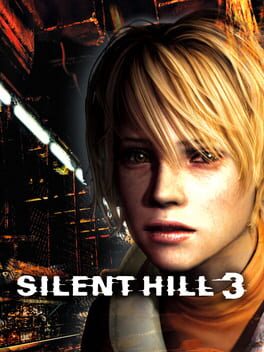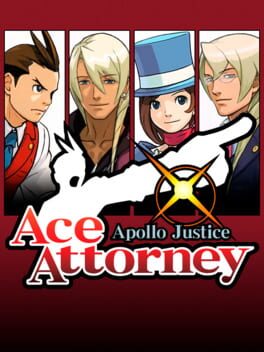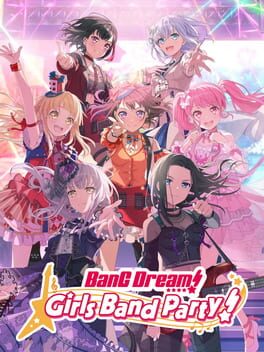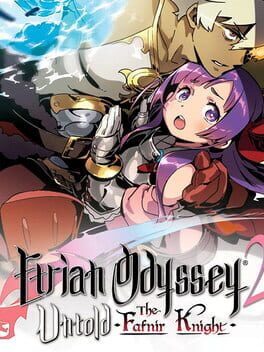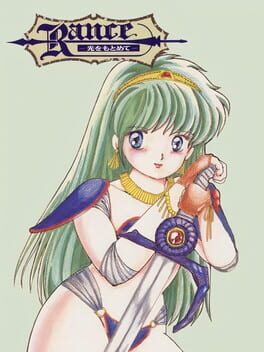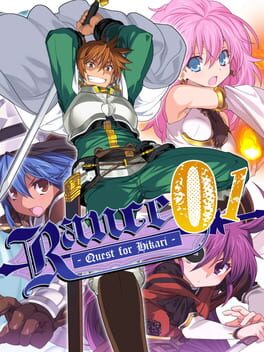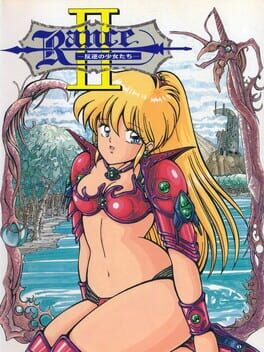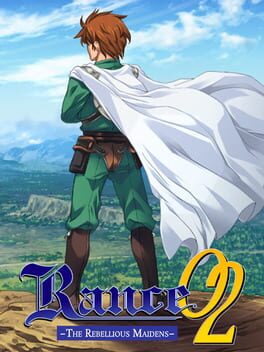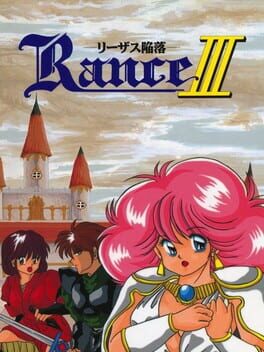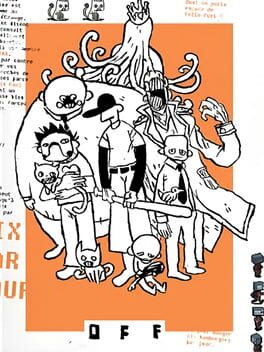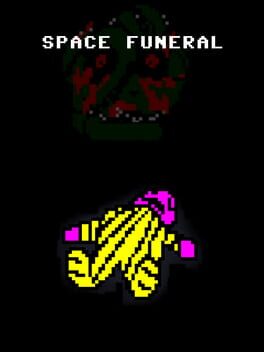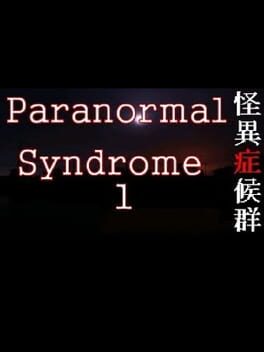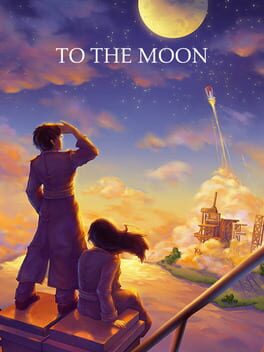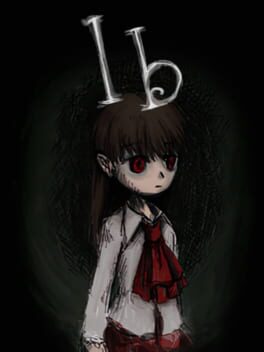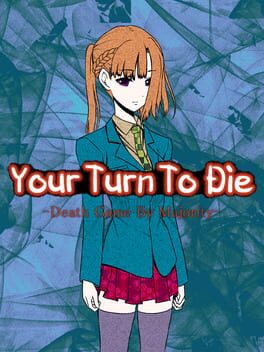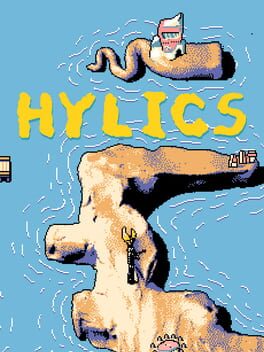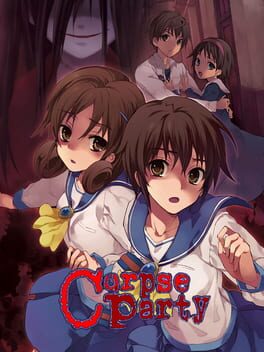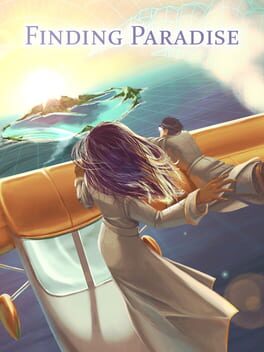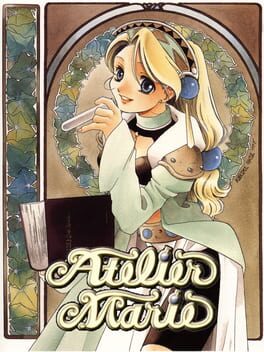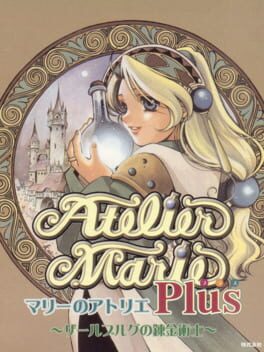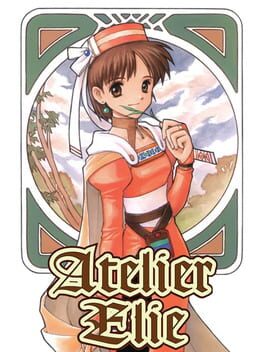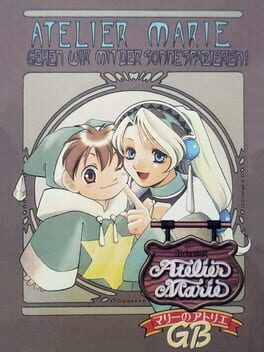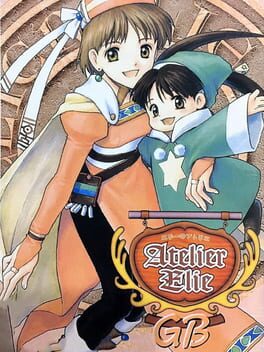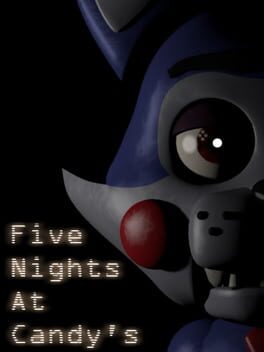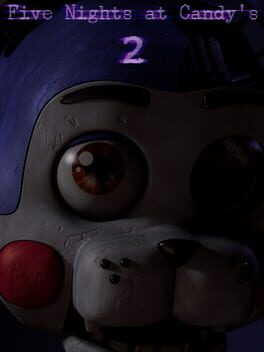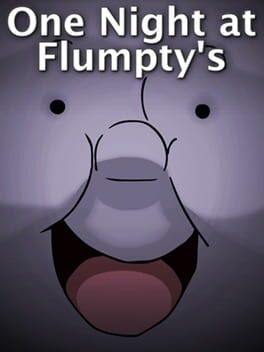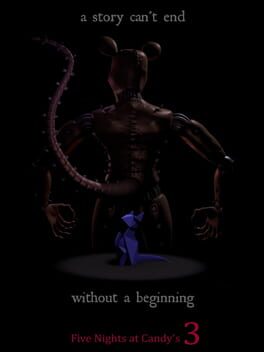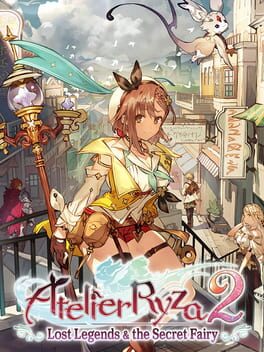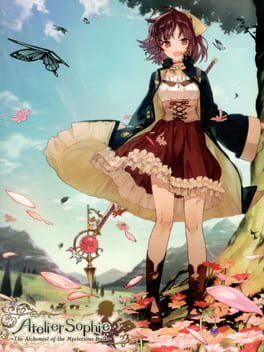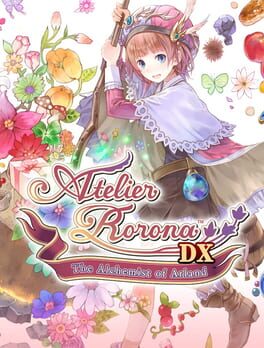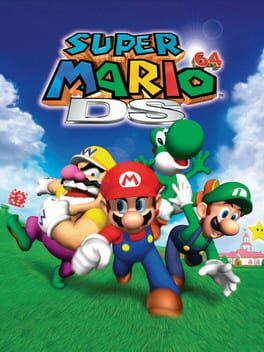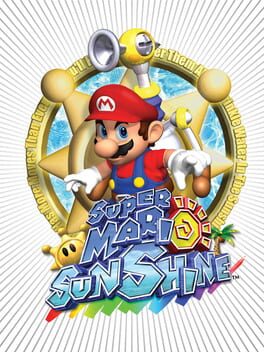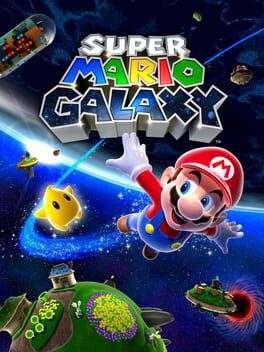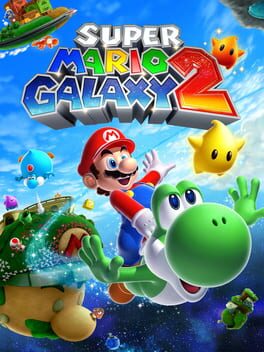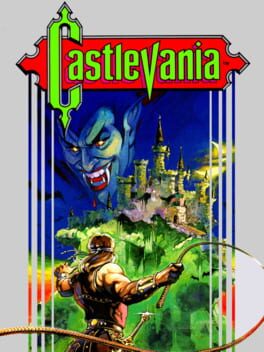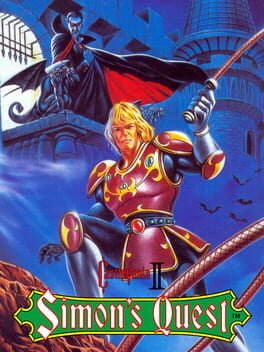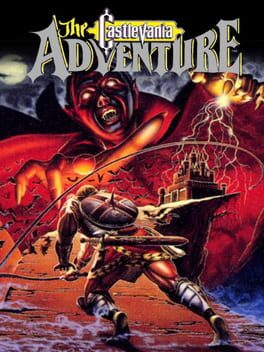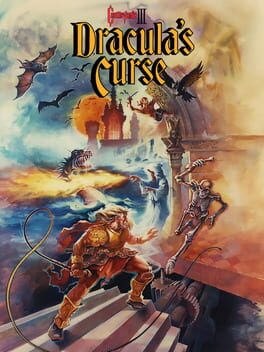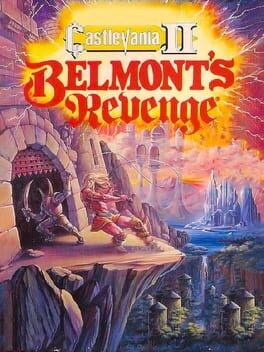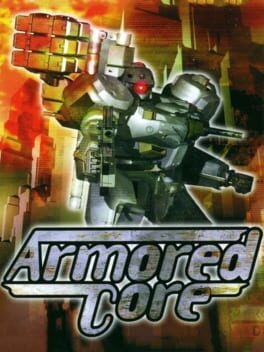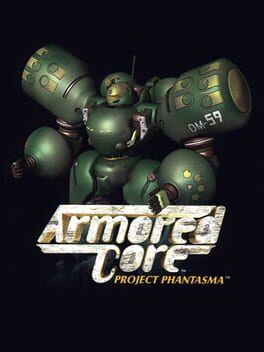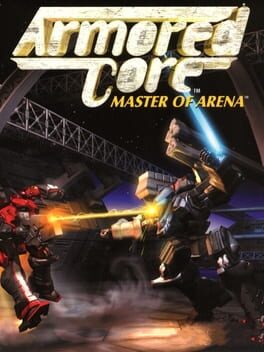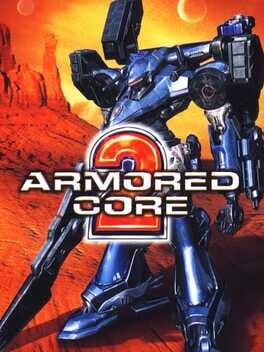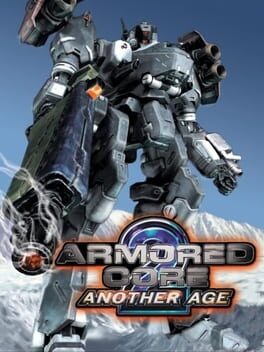falcorito
77 reviews liked by falcorito
Persona 3 Reload
2024
Reviews of other games: The deckbuilder combat is certainly enthralling, but I'm not sure if it synergizes with the roguelike structure or if it's just a cheap and trendy cash-in, similar to yesteryear's Soulslikes...
Reviews of P3R: When I was fourteen years old I would lay in bed with my eyes open and ask for God to kill me. My brother left behind a beat-up PS2 after he went off to college where he would later die of an OD
Reviews of P3R: When I was fourteen years old I would lay in bed with my eyes open and ask for God to kill me. My brother left behind a beat-up PS2 after he went off to college where he would later die of an OD
Knights College
2021
Time to out myself as gay furry trash on the gaming internet!
Knights College is just okay.
It has very pretty artwork and character designs (at least to my liking), the music is alright, and the story is... just fine. It's a very trope-y gay furry dating simulator that takes place in a sorta magic school setting. You can mostly take your guesses from there as to what to expect. The R18 patch stuff (grab from the game's website, it's not installed by default on Steam) is also, uh, nice.
I think my biggest issues with Knights College is more that this is an unfinished story that is far too short with not enough content and variety for the far too steep asking price of $25 dollars. Seven of the ten characters get a scene with Argo, but it's a coin flip for who really gets any development or time beyond their dedicated chapters. Oscar, Diderich, and Theo by the end get the most time spent on fleshing out their background (along with some genuinely alright world building), but everyone else feels either incredibly one-note (Grantly and Julius) or severely underused (Celio, the two dragons). The endgame content after the regular ending I did like a fair bit, and the "Card" system re-contextualizes going for that last true ending in a way that's easy to understand and also feels rewarding in a manner that I actually kind of wish other visual novels in general would do a better job with. You don't have to have a route guide open or anything for this, you can just follow the game at its own pace and make your choices as you see fit for the endings.
I can't write this without also mentioning that there's a, thing, the game has with... consent. The protagonist and the characters both like each other and it never got close to being deeply upsetting to me, but Knights College has a very fiddly relationship with certain things being consensual in the moment that will be eyebrow raising to some, and be a red flag to others. As much as I'm not overly upset by any of it, I also can't defend it in the slightest, and all I can really do is hope that the next part does a better job with this.
It almost funnily enough makes Diderich objectively the best of the cast because his relationship is fully consensual between Argo and him, and because his relationship is developed over multiple chapters and genuinely builds a real liking to the protagonist; his scene for Argo feels earned rather than just suddenly in the moment.
All I can really say is that if you're gay furry trash like I am, Knights College is fine but still hard to recommend. The $25 price tag is far too steep for a story that is unfinished and far too short at the moment. As nice as the artwork is and that I do like these characters, the overall quality and polish isn't always the highest, and there really should have been another chapter or two to flesh out more of the cast.
Knights College is just okay.
It has very pretty artwork and character designs (at least to my liking), the music is alright, and the story is... just fine. It's a very trope-y gay furry dating simulator that takes place in a sorta magic school setting. You can mostly take your guesses from there as to what to expect. The R18 patch stuff (grab from the game's website, it's not installed by default on Steam) is also, uh, nice.
I think my biggest issues with Knights College is more that this is an unfinished story that is far too short with not enough content and variety for the far too steep asking price of $25 dollars. Seven of the ten characters get a scene with Argo, but it's a coin flip for who really gets any development or time beyond their dedicated chapters. Oscar, Diderich, and Theo by the end get the most time spent on fleshing out their background (along with some genuinely alright world building), but everyone else feels either incredibly one-note (Grantly and Julius) or severely underused (Celio, the two dragons). The endgame content after the regular ending I did like a fair bit, and the "Card" system re-contextualizes going for that last true ending in a way that's easy to understand and also feels rewarding in a manner that I actually kind of wish other visual novels in general would do a better job with. You don't have to have a route guide open or anything for this, you can just follow the game at its own pace and make your choices as you see fit for the endings.
I can't write this without also mentioning that there's a, thing, the game has with... consent. The protagonist and the characters both like each other and it never got close to being deeply upsetting to me, but Knights College has a very fiddly relationship with certain things being consensual in the moment that will be eyebrow raising to some, and be a red flag to others. As much as I'm not overly upset by any of it, I also can't defend it in the slightest, and all I can really do is hope that the next part does a better job with this.
It almost funnily enough makes Diderich objectively the best of the cast because his relationship is fully consensual between Argo and him, and because his relationship is developed over multiple chapters and genuinely builds a real liking to the protagonist; his scene for Argo feels earned rather than just suddenly in the moment.
All I can really say is that if you're gay furry trash like I am, Knights College is fine but still hard to recommend. The $25 price tag is far too steep for a story that is unfinished and far too short at the moment. As nice as the artwork is and that I do like these characters, the overall quality and polish isn't always the highest, and there really should have been another chapter or two to flesh out more of the cast.
Uno dei migliori giochi Pokémon di sempre, bandiera di un'epoca, ormai passata, in cui non si aveva paura di sperimentare, inserendo tematiche più adulte e complesse all'interno di un gioco indirizzato anche ai più piccoli. Non si parla, ovviamente, di argomenti troppo violenti o filosofici, perché siamo pur sempre immersi nell'idilliaco mondo dei Pokèmon, anche se certe situazioni sono al limite dell'horror.
Esploratori del Cielo, insieme a Esploratori del Tempo e dell'Oscurità, rappresenta il sequel, ambientato in un luogo ed epoca diversa, di Squadra Rossa e Blu, di cui riprende lo scheletro di strategico/rougelite con scontri a turni, espandendone il gameplay e la trama.
Dal punto di vista della storia non c'è nulla da dire, dato che si prefigura come il perfetto racconto per ragazzi, un'avventura epica di formazione che, tramite gli eventi narrati, insegna al giocatore non solo i classici valori da perseguire, ma anche a superare le difficoltà e le ingiustizie che la stessa vita ti pone davanti, come il tradimento, la scomparsa dei propri cari, il bullismo e, in alcuni casi, la prospettiva della propria morte.
Per quanto riguarda il gameplay, questo titolo ha luci e ombre. Le innovazioni rispetto al prequel sono spesso semplificatrici: a parte certi dungeon di end-game, tutti gli altri sono stati accorciati e più semplici da superare, così come quelli del "dojo", che non offrono più le classiche "bossfight monotipo" di fine livello. L'elemento che più mi è dispiaciuto veder banalizzato, tuttavia, è il reclutamento Pokemon: se nei precedenti titoli, prima di "catturare" un pokemon, dovevi comprare o conquistare la sua area amico (ossia l'habitat naturale che condivideva con altre specie), ognuna dal design unico, ora non si verifica più questo problema, permettendoti di reclutare chiunque in qualsiasi momento da inizio gioco, tranne in rare occasioni per motivi di trama. L'acquisizione di una nuova area amico, la sua esplorazione e il mistero legato all'identità delle creature che potevano effettivamente viverci, rendevano unico questo franchise e ti spingevano a giocarlo fino al suo totale completamento. Peccato.
Di contro, Esploratori del Cielo offre tante novità apprezzabili, oltre ai Pokemon di 4 gen, come gli artwork delle espressioni facciali durante i dialoghi disponibili per tutti e 400 i Pokemon, una miriade di nuovi oggetti, dungeon inediti, tante tipologie di missioni differenti ed episodi spinoff giocabili, aventi come protagonisti i vari personaggi conosciuti durante la storia principale.
Come ho detto, luci ed ombre, ma fortunatamente a prevalere sono le prime.
Artisticamente il gioco è splendido, la pixel art mai come in questo caso ha valorizzato così tanto un titolo Pokemon: le animazioni sono tutte eccellenti e riescono a farti percepire ogni stato d'animo dei personaggi, per quanto siano piccoli, mentre le ambientazioni e i dungeon sono un piacere per gli occhi. Similmente possiamo dire della colonna sonora, magistrale praticamente sempre, perfettamente adatta come accompagnamento musicale durante le tante esplorazioni.
Se non lo avete giocato, giocatelo. Senza se e senza ma.
Quando arriverete alla battaglia finale mi ringrazierete.
Esploratori del Cielo, insieme a Esploratori del Tempo e dell'Oscurità, rappresenta il sequel, ambientato in un luogo ed epoca diversa, di Squadra Rossa e Blu, di cui riprende lo scheletro di strategico/rougelite con scontri a turni, espandendone il gameplay e la trama.
Dal punto di vista della storia non c'è nulla da dire, dato che si prefigura come il perfetto racconto per ragazzi, un'avventura epica di formazione che, tramite gli eventi narrati, insegna al giocatore non solo i classici valori da perseguire, ma anche a superare le difficoltà e le ingiustizie che la stessa vita ti pone davanti, come il tradimento, la scomparsa dei propri cari, il bullismo e, in alcuni casi, la prospettiva della propria morte.
Per quanto riguarda il gameplay, questo titolo ha luci e ombre. Le innovazioni rispetto al prequel sono spesso semplificatrici: a parte certi dungeon di end-game, tutti gli altri sono stati accorciati e più semplici da superare, così come quelli del "dojo", che non offrono più le classiche "bossfight monotipo" di fine livello. L'elemento che più mi è dispiaciuto veder banalizzato, tuttavia, è il reclutamento Pokemon: se nei precedenti titoli, prima di "catturare" un pokemon, dovevi comprare o conquistare la sua area amico (ossia l'habitat naturale che condivideva con altre specie), ognuna dal design unico, ora non si verifica più questo problema, permettendoti di reclutare chiunque in qualsiasi momento da inizio gioco, tranne in rare occasioni per motivi di trama. L'acquisizione di una nuova area amico, la sua esplorazione e il mistero legato all'identità delle creature che potevano effettivamente viverci, rendevano unico questo franchise e ti spingevano a giocarlo fino al suo totale completamento. Peccato.
Di contro, Esploratori del Cielo offre tante novità apprezzabili, oltre ai Pokemon di 4 gen, come gli artwork delle espressioni facciali durante i dialoghi disponibili per tutti e 400 i Pokemon, una miriade di nuovi oggetti, dungeon inediti, tante tipologie di missioni differenti ed episodi spinoff giocabili, aventi come protagonisti i vari personaggi conosciuti durante la storia principale.
Come ho detto, luci ed ombre, ma fortunatamente a prevalere sono le prime.
Artisticamente il gioco è splendido, la pixel art mai come in questo caso ha valorizzato così tanto un titolo Pokemon: le animazioni sono tutte eccellenti e riescono a farti percepire ogni stato d'animo dei personaggi, per quanto siano piccoli, mentre le ambientazioni e i dungeon sono un piacere per gli occhi. Similmente possiamo dire della colonna sonora, magistrale praticamente sempre, perfettamente adatta come accompagnamento musicale durante le tante esplorazioni.
Se non lo avete giocato, giocatelo. Senza se e senza ma.
Quando arriverete alla battaglia finale mi ringrazierete.
PROS:
- case quality-wise, easily the best in the series alongside AAI2. case 2 in particular has to be my favourite filler case in the series
- everything good about dgs1 is also good here (the cast, the presentation, just the overall feel of 19th century Ace Attorney)
- fully delivers on the amazing set-up of dgs1, making this duology the peak of the series, and very accessible for people who have never played ace attorney before (while also offering a lot of twists and subversions on the usual formula for those who have!)
- contender for funniest game in the series, every sholmes deduction section had me dying, and van zieks' reactions to the shit you pull out of your ass are still gold. even the throwaway witnesses are all great here. 90% of my playtime was spent smiling
- the port and localisation quality is very good. though there's a couple mods i recommend playing with (one allowing animations to be 60fps, another improving music quality)
CONS:
- much like dgs1, DO NOT GO IN ON AN EMPTY STOMACH. i made this mistake and ended up dining with my husbando, gregson, unexpectedly. so the price of this game may be deceptive.
- goes hard on the asset reuse. which is fine since it does it well, but it also makes it the only ace attorney game that heavily reuses the soundtrack of another. which is also fine because DGS has one of the best OSTs in the series. but damn it i want more. (EDIT: actually upon checking, this game had like 2 hours of new music which is more than i remembered. still wouldve liked a different cross examination theme or something tho)
- pacing not the smoothest. i think Scarlet Study (the fan TL people) said that these were meant to be 3 games, but budget issues and lack of popularity meant we only got 2. dont remember what their basis for this was but it does kinda feel like there should've been more.
- upon finishing this, you will immediately begin to despair at the thought of ryunosuke, sustato, sholmes, van zieks and the rest of the cast never appearing in an ace attorney game again.
FINAL VERDICT:
Guilty... of being a sick ass game and miniseries that everyone should play. i still cant believe i actually finally got to play this and it didn't let me down at all
- case quality-wise, easily the best in the series alongside AAI2. case 2 in particular has to be my favourite filler case in the series
- everything good about dgs1 is also good here (the cast, the presentation, just the overall feel of 19th century Ace Attorney)
- fully delivers on the amazing set-up of dgs1, making this duology the peak of the series, and very accessible for people who have never played ace attorney before (while also offering a lot of twists and subversions on the usual formula for those who have!)
- contender for funniest game in the series, every sholmes deduction section had me dying, and van zieks' reactions to the shit you pull out of your ass are still gold. even the throwaway witnesses are all great here. 90% of my playtime was spent smiling
- the port and localisation quality is very good. though there's a couple mods i recommend playing with (one allowing animations to be 60fps, another improving music quality)
CONS:
- much like dgs1, DO NOT GO IN ON AN EMPTY STOMACH. i made this mistake and ended up dining with my husbando, gregson, unexpectedly. so the price of this game may be deceptive.
- goes hard on the asset reuse. which is fine since it does it well, but it also makes it the only ace attorney game that heavily reuses the soundtrack of another. which is also fine because DGS has one of the best OSTs in the series. but damn it i want more. (EDIT: actually upon checking, this game had like 2 hours of new music which is more than i remembered. still wouldve liked a different cross examination theme or something tho)
- pacing not the smoothest. i think Scarlet Study (the fan TL people) said that these were meant to be 3 games, but budget issues and lack of popularity meant we only got 2. dont remember what their basis for this was but it does kinda feel like there should've been more.
- upon finishing this, you will immediately begin to despair at the thought of ryunosuke, sustato, sholmes, van zieks and the rest of the cast never appearing in an ace attorney game again.
FINAL VERDICT:
Guilty... of being a sick ass game and miniseries that everyone should play. i still cant believe i actually finally got to play this and it didn't let me down at all
The person that recommended the Atelier series to me made such good points that I bought the two PS3 trilogies on impulse before actually trying the games out. Looking back, it was a terrifying idea to own six games I could, just by playing one of them, find out I disliked. I’m glad, then, that Atelier Rorona proved to be such a fascinating experience.
Atelier is a series of turn-based RPGs that revolve around alchemy. In general, its protagonists are alchemists who are given some task to perform in a limited amount of in-game time, and it’s your job as the player to manage their use of that time so that they are successful.
This is a very long running series, dating back to the PS1, and since I started it in 2018, if I were to play every single game, well, it would likely take a decade for me to catch up. Fortunately, the series is split in trilogies, each of which begins a new story with a new setting and characters, so it’s pretty easy to jump into.
Atelier Rorona came out on the PS3 in 2009 and was the series’ first foray into full 3D, beginning a new trilogy that came to be called The Arland Trilogy. The game was later rereleased as Rorona Plus, which brings mechanical improvements and an expanded story to the original game, and Rorona DX, which is a remastered version of Plus for newer platforms and is the recommended version nowadays.
Atelier Rorona puts you in the role of Rorolina Frixell, or, how people usually call her, Rorona. Rorona is an apprentice at the alchemy workshop in the Kingdom of Arland, however, her days working there might be numbered: the palace has decided to shut down the workshop unless it can be proved, over the three years that follow, that its existence is beneficial to the kingdom. Her master having bailed out, Rorona takes up the challenge of meeting the palace’s demands, a task that will require the fledgling alchemist to rapidly improve her skills.
Already, you can see the game subverting some of the expectations you might have coming into an RPG. There is no huge central conflict here, at least not in the sense that you’d usually expect a JRPG to have. You know, ominous prophecies, a looming evil, a powerful villain threatening to destroy the planet… Instead, Rorona’s mission is one of self-improvement, fulfilling a rather bureaucratic ordeal to prove her capabilities as an alchemist. Stabbing people with swords, or walking into someone’s house armed to the teeth won’t help her achieve that.
It’s a narrative that's ultimately peaceful. There are no boss fights in the story and the antagonist, if you can call him that, is merely a bureaucrat who never confronts you directly. There isn’t even anything remotely like a final confrontation to wrap up the game: once the three years run their course, the story ends, and Rorona’s story gets a conclusion that corresponds to your performance over the course of the game.
The person who sold me on the Atelier series described it as “feminine”, and I think that’s sort of fitting. If there’s one thing I despise, it’s the male power fantasy that so often appears in Japanese media, where the protagonist, male, often unremarkable, becomes an extraordinary hero and gets rewarded with fame and one-dimensional women. It’s something I try my best to avoid when picking which games to play.
But Atelier doesn’t simply evade these tropes, it runs straight in the opposite direction. It’s protagonists are almost always female, there are no “chosen one” plots or heroes of legend, and its plots forgo the emphasis on fighting in favor of being about building something up, be that a business, a reputation, knowledge, relationships with other people…
Going back to Atelier Rorona, it’s only appropriate that, in a story that doesn’t need a hero, our protagonist is not hero material. Rorona is clumsy, shy, largely inexperienced and oblivious to many things that happen around her. Because of her nature, she gets into all sorts of unexpected (and hilarious) situations with people.
Befriending the supporting characters is part of the joy of playing the game. Each of them is quirky in their own way and has their own backstory to be uncovered, and it’s here that Rorona shines as a protagonist: she’s a gentle and caring soul that will do whatever is in her power to help others, someone who’s impossible not to like. It’s worth taking the time to get closer to everyone, in fact, the game’s multiple endings are affected not only by your performance as an alchemist, but also, the relationships you build.
Over the three years you play through, the game will have you fulfilling twelve requests by the kingdom, each of which has a deadline set approximately three months after starting it. In general, you’re tasked with providing the castle with a certain kind of item, either by crafting or by gathering. It sounds simple, maybe too easy, but the game has enough depth that those three years spent in Arland are sure to be hectic.
For starters, the time management is surprisingly severe. Every item you craft, as well as every gathering area you visit, takes at least one day of your time, and the further you go into the story, the higher the amount of days required. This forces you to make many saves and carefully plan your moves.
Then there’s the power creep, and how the game manages character growth and progression. Managing time is not simply about completing the palace’s demands, but also, keeping your equipment updated so you don’t fall behind the enemies you face while travelling. Note that I say “equipment”: while there are character levels in the game, they’re largely irrelevant compared to the power items net you, and even then, the game’s time requirements actively discourage grinding exp.
The dynamic that results from this design choice of focusing on items is very interesting: if you were to plot the difficulty over time of the average JRPG in a graph, it would probably look like an ascending slope. In Atelier Rorona, since new items are less frequent but provide significant boosts, the curve would look like a series of steps: you’re faced with a seemingly unsurmountable challenge and have to work your way into creating a new, powerful item, with which you proceed to steamroll everything until your arsenal becomes obsolete and you need to find something new to create.
I’ve never seen anything quite like this. Over and over again, the game gives you something that makes you completely overpowered, like nothing in the game will be able to stop you, and then follows it up with making you utterly miserable and helpless, forcing you back to the drawing board to find some new asset and restart the cycle.
While those hurdles are mostly found in combat, the crafting system itself isn’t free of twists, even if it remains more or less the same the whole game. Just look at your relationship with money in the game: at first, it is a scarce resource that allows you to buy materials from shops. Soon, those materials fall behind the ones you can gather, so your gold piles up. Then the wholesale mechanic becomes available, boom, you need lots of dosh again. Item traits become more relevant as they overpower items with raw quality, so money is useless again since it can’t buy traits, but then later you need piles of cash to create endgame weapons and armor… you get the idea.
The way such a simple game is constantly twisting and turning is insane, and I have to applaud the designers’ deviousness. As a player, though, I have to admit, the gameplay’s frantic pace does get frustrating sometimes. I actually felt like dropping the game when I got stuck at one point, and even though I eventually figured it out, it took looking at tons of guides online.
Looking at the game as a whole, I’m certain it could do with being more generous, both by giving the player more materials, and by lowering the time requirements for certain activities. It would certainly make for a less stressful experience.
Also, as much as the game doesn’t have the strict schedule something like Persona does, you’ll have to spend some time reading guides for another reason: there’s a lot of essential knowledge about the crafting system only found in Youtube and GameFAQs’s forums, courtesy of folks like MrSalaries, Solarys and others. You have to read through their posts to be successful in the latter half of the game, and I can only hope those boards never go down, lest we lose all that information.
With all that said, if I was able to withstand Persona’s mercilessness before, I can definitely handle doing some research on mechanics to finish a game, and I’m looking forward to playing the rest of the series. Especially after playing the extra story segment that comes at the end of the Plus version of Atelier Rorona. It’s called Overtime, and in it, you get to meet Totori and Meruru, the protagonists of the next two games. It's a fascinating way to set up the sequels.
What can I say? It may have been a rough journey, but Rorona made me completely fall in love with the Atelier series. It’s a fantastic twist on the JRPG genre that I never knew I wanted, which may be why it flew under my radar for so long. It's a game, and a series, I wholeheartedly recommend.
Atelier is a series of turn-based RPGs that revolve around alchemy. In general, its protagonists are alchemists who are given some task to perform in a limited amount of in-game time, and it’s your job as the player to manage their use of that time so that they are successful.
This is a very long running series, dating back to the PS1, and since I started it in 2018, if I were to play every single game, well, it would likely take a decade for me to catch up. Fortunately, the series is split in trilogies, each of which begins a new story with a new setting and characters, so it’s pretty easy to jump into.
Atelier Rorona came out on the PS3 in 2009 and was the series’ first foray into full 3D, beginning a new trilogy that came to be called The Arland Trilogy. The game was later rereleased as Rorona Plus, which brings mechanical improvements and an expanded story to the original game, and Rorona DX, which is a remastered version of Plus for newer platforms and is the recommended version nowadays.
Atelier Rorona puts you in the role of Rorolina Frixell, or, how people usually call her, Rorona. Rorona is an apprentice at the alchemy workshop in the Kingdom of Arland, however, her days working there might be numbered: the palace has decided to shut down the workshop unless it can be proved, over the three years that follow, that its existence is beneficial to the kingdom. Her master having bailed out, Rorona takes up the challenge of meeting the palace’s demands, a task that will require the fledgling alchemist to rapidly improve her skills.
Already, you can see the game subverting some of the expectations you might have coming into an RPG. There is no huge central conflict here, at least not in the sense that you’d usually expect a JRPG to have. You know, ominous prophecies, a looming evil, a powerful villain threatening to destroy the planet… Instead, Rorona’s mission is one of self-improvement, fulfilling a rather bureaucratic ordeal to prove her capabilities as an alchemist. Stabbing people with swords, or walking into someone’s house armed to the teeth won’t help her achieve that.
It’s a narrative that's ultimately peaceful. There are no boss fights in the story and the antagonist, if you can call him that, is merely a bureaucrat who never confronts you directly. There isn’t even anything remotely like a final confrontation to wrap up the game: once the three years run their course, the story ends, and Rorona’s story gets a conclusion that corresponds to your performance over the course of the game.
The person who sold me on the Atelier series described it as “feminine”, and I think that’s sort of fitting. If there’s one thing I despise, it’s the male power fantasy that so often appears in Japanese media, where the protagonist, male, often unremarkable, becomes an extraordinary hero and gets rewarded with fame and one-dimensional women. It’s something I try my best to avoid when picking which games to play.
But Atelier doesn’t simply evade these tropes, it runs straight in the opposite direction. It’s protagonists are almost always female, there are no “chosen one” plots or heroes of legend, and its plots forgo the emphasis on fighting in favor of being about building something up, be that a business, a reputation, knowledge, relationships with other people…
Going back to Atelier Rorona, it’s only appropriate that, in a story that doesn’t need a hero, our protagonist is not hero material. Rorona is clumsy, shy, largely inexperienced and oblivious to many things that happen around her. Because of her nature, she gets into all sorts of unexpected (and hilarious) situations with people.
Befriending the supporting characters is part of the joy of playing the game. Each of them is quirky in their own way and has their own backstory to be uncovered, and it’s here that Rorona shines as a protagonist: she’s a gentle and caring soul that will do whatever is in her power to help others, someone who’s impossible not to like. It’s worth taking the time to get closer to everyone, in fact, the game’s multiple endings are affected not only by your performance as an alchemist, but also, the relationships you build.
Over the three years you play through, the game will have you fulfilling twelve requests by the kingdom, each of which has a deadline set approximately three months after starting it. In general, you’re tasked with providing the castle with a certain kind of item, either by crafting or by gathering. It sounds simple, maybe too easy, but the game has enough depth that those three years spent in Arland are sure to be hectic.
For starters, the time management is surprisingly severe. Every item you craft, as well as every gathering area you visit, takes at least one day of your time, and the further you go into the story, the higher the amount of days required. This forces you to make many saves and carefully plan your moves.
Then there’s the power creep, and how the game manages character growth and progression. Managing time is not simply about completing the palace’s demands, but also, keeping your equipment updated so you don’t fall behind the enemies you face while travelling. Note that I say “equipment”: while there are character levels in the game, they’re largely irrelevant compared to the power items net you, and even then, the game’s time requirements actively discourage grinding exp.
The dynamic that results from this design choice of focusing on items is very interesting: if you were to plot the difficulty over time of the average JRPG in a graph, it would probably look like an ascending slope. In Atelier Rorona, since new items are less frequent but provide significant boosts, the curve would look like a series of steps: you’re faced with a seemingly unsurmountable challenge and have to work your way into creating a new, powerful item, with which you proceed to steamroll everything until your arsenal becomes obsolete and you need to find something new to create.
I’ve never seen anything quite like this. Over and over again, the game gives you something that makes you completely overpowered, like nothing in the game will be able to stop you, and then follows it up with making you utterly miserable and helpless, forcing you back to the drawing board to find some new asset and restart the cycle.
While those hurdles are mostly found in combat, the crafting system itself isn’t free of twists, even if it remains more or less the same the whole game. Just look at your relationship with money in the game: at first, it is a scarce resource that allows you to buy materials from shops. Soon, those materials fall behind the ones you can gather, so your gold piles up. Then the wholesale mechanic becomes available, boom, you need lots of dosh again. Item traits become more relevant as they overpower items with raw quality, so money is useless again since it can’t buy traits, but then later you need piles of cash to create endgame weapons and armor… you get the idea.
The way such a simple game is constantly twisting and turning is insane, and I have to applaud the designers’ deviousness. As a player, though, I have to admit, the gameplay’s frantic pace does get frustrating sometimes. I actually felt like dropping the game when I got stuck at one point, and even though I eventually figured it out, it took looking at tons of guides online.
Looking at the game as a whole, I’m certain it could do with being more generous, both by giving the player more materials, and by lowering the time requirements for certain activities. It would certainly make for a less stressful experience.
Also, as much as the game doesn’t have the strict schedule something like Persona does, you’ll have to spend some time reading guides for another reason: there’s a lot of essential knowledge about the crafting system only found in Youtube and GameFAQs’s forums, courtesy of folks like MrSalaries, Solarys and others. You have to read through their posts to be successful in the latter half of the game, and I can only hope those boards never go down, lest we lose all that information.
With all that said, if I was able to withstand Persona’s mercilessness before, I can definitely handle doing some research on mechanics to finish a game, and I’m looking forward to playing the rest of the series. Especially after playing the extra story segment that comes at the end of the Plus version of Atelier Rorona. It’s called Overtime, and in it, you get to meet Totori and Meruru, the protagonists of the next two games. It's a fascinating way to set up the sequels.
What can I say? It may have been a rough journey, but Rorona made me completely fall in love with the Atelier series. It’s a fantastic twist on the JRPG genre that I never knew I wanted, which may be why it flew under my radar for so long. It's a game, and a series, I wholeheartedly recommend.
If you're into Atelier, it's Atelier. As a newcomer that was POSSESSED with the need to craft cute ointments while browsing the lightbulb selection of a local store irl (I don't know what came over me) I decided that Ayesha was going to be the Atelier game entrusted to that fine purpose.
It's okay! It's cute, it's crafty... it's okay! It's interesting, an RPG where you battle with pretty much items only. Sooo cuuute my fucking bomb that explodes you violently. I made that.
I will forever be fond of this game for satisfying the inscrutable exhortations of my soul, even if just for a few weeks. Jesus, even remembering this is making me feel a bit emotional. What the fuck happened to me at that lightbulb store.
It's okay! It's cute, it's crafty... it's okay! It's interesting, an RPG where you battle with pretty much items only. Sooo cuuute my fucking bomb that explodes you violently. I made that.
I will forever be fond of this game for satisfying the inscrutable exhortations of my soul, even if just for a few weeks. Jesus, even remembering this is making me feel a bit emotional. What the fuck happened to me at that lightbulb store.
BioShock Remastered
2016
Style over substance.
These graphics are great for the time, but nowadays it's mostly the little bit of artstyle sprinkled on top that salvage the ever-aging "realistic" PS3 graphics. There's a backdrop of aquatic steampunk never to be reached while you're stuck clawing your way through rundown corridors. Hey, fits the story lololol I'm not gonna diss the garden though. Now, I thought plasmids were cool. But so what? Why are you throwing goons at me that can withstand 14 shotgun bullets to the cranium. While my character is having a seizure and stops shooting because the bad guy is making him change plasmids in the middle of a gunfight (he didn't take his meds). This is a regular ass story with S tier dialogue wasted on weak characters imagine my favorite OCs with this dialogue instead of Jonah Jameson lookin ass yippee!!
Oh, I didn't know I had to save before splurging on ammo before the final boss. Guess I'll watch the end on Youtube even though it's probably not worth seeing.
These graphics are great for the time, but nowadays it's mostly the little bit of artstyle sprinkled on top that salvage the ever-aging "realistic" PS3 graphics. There's a backdrop of aquatic steampunk never to be reached while you're stuck clawing your way through rundown corridors. Hey, fits the story lololol I'm not gonna diss the garden though. Now, I thought plasmids were cool. But so what? Why are you throwing goons at me that can withstand 14 shotgun bullets to the cranium. While my character is having a seizure and stops shooting because the bad guy is making him change plasmids in the middle of a gunfight (he didn't take his meds). This is a regular ass story with S tier dialogue wasted on weak characters imagine my favorite OCs with this dialogue instead of Jonah Jameson lookin ass yippee!!
Oh, I didn't know I had to save before splurging on ammo before the final boss. Guess I'll watch the end on Youtube even though it's probably not worth seeing.
Feels-good-man type beat. You meet some bums and you kick their butt but nothing terrifying is aluded to in the course of your life as Ryza (or is it?). I wouldn't have it any other way. Being faced with the prospect of finding a real job, there are no thoughts in Ryza's head... Same, girl. It goes well with the mandatory quest system where this time it's limited mostly to people Ryza has known for some time, and new skills are locked behind personal achievements for the characters. Diegetic achievement system?? So, no trope of meeting a bunch of random people and changing the course of their lives forever (yeah I played Octopath recently), Ryza gossips and does shopping, there's literally a quest where you talk to this old dude Ryza knows who's back from traveling for some time and that's it, the quest is completed without doing anything... feels like half the quests don't require you to do anything but talk actually.
The battle mechanics are a bit goofy BUT I appreciate it trying to be unique (inb4 dozens of games pop up on my feed with that exact system) and it gets better as the mechanics start to sink in, and don't be surprised when the Pokémon syndrome of bosses going from house-sized to goat-sized during battles starts to creep in. The movements are jank but not too severely, I don't really see the point of adding a jump other than having me mash the jump button when I'm running because yes, I'm that restless. I also wanna point out this hoe is insulting me every 30 seconds in the background while I'm writing this review, so I'll wrap this up... farm girls smh.
The battle mechanics are a bit goofy BUT I appreciate it trying to be unique (inb4 dozens of games pop up on my feed with that exact system) and it gets better as the mechanics start to sink in, and don't be surprised when the Pokémon syndrome of bosses going from house-sized to goat-sized during battles starts to creep in. The movements are jank but not too severely, I don't really see the point of adding a jump other than having me mash the jump button when I'm running because yes, I'm that restless. I also wanna point out this hoe is insulting me every 30 seconds in the background while I'm writing this review, so I'll wrap this up... farm girls smh.
Silent Hill 3
2003
note to others: maybe play sh1 first? I didn’t but from what little I know this features a whole lot of threads continued from SH1 and I did feel like I was missing a bit of proper noun context
obviously i've gotta think about this one some more wrt themes but first impressions, it's great. i think it's great for very different reasons than silent hill 2 is great and that you probably shouldn't go in expecting silent hill 2 2, but the level design and visuals and audio contribute to a very uniquely oppressive experience, far more than I ever think really get reached in SH2. scary? i'm not sure (but i haven't really had luck with Any "video game" really scaring me quite as much as some other methods of telling horror narratives that make the observer much more powerless like VNs or film) but i don't really feel like this is the lens you should be approaching SH3 with regardless. story-wise, it's been said before but this is on its surface very shlocky and campy especially compared to the consistently dour SH2 but the moments where that veneer cracks are really heartbreaking. and again there's very obviously a lot of themes floating around here with respect to the misogynies that latently exist within a lot of society but im gonna need more than 30 minutes at 4 am to fully parse that, and once I do i doubt i could do a better job than most of the reviews at the top of this page.
also sidenote i played this one on tank controls BUT with the emulator bound to mouse+keyboard (wasd for dpad, right click to ready, and left click to fire, this is similar to what it was set to on killer7 i think), and this actually plays really good? the camera is a complete mess that hates you but i think i've finally found a setup for tank control games that actually doesnt suck, which makes me excited to be able to delve into this era of stuff a bit more readily
obviously i've gotta think about this one some more wrt themes but first impressions, it's great. i think it's great for very different reasons than silent hill 2 is great and that you probably shouldn't go in expecting silent hill 2 2, but the level design and visuals and audio contribute to a very uniquely oppressive experience, far more than I ever think really get reached in SH2. scary? i'm not sure (but i haven't really had luck with Any "video game" really scaring me quite as much as some other methods of telling horror narratives that make the observer much more powerless like VNs or film) but i don't really feel like this is the lens you should be approaching SH3 with regardless. story-wise, it's been said before but this is on its surface very shlocky and campy especially compared to the consistently dour SH2 but the moments where that veneer cracks are really heartbreaking. and again there's very obviously a lot of themes floating around here with respect to the misogynies that latently exist within a lot of society but im gonna need more than 30 minutes at 4 am to fully parse that, and once I do i doubt i could do a better job than most of the reviews at the top of this page.
also sidenote i played this one on tank controls BUT with the emulator bound to mouse+keyboard (wasd for dpad, right click to ready, and left click to fire, this is similar to what it was set to on killer7 i think), and this actually plays really good? the camera is a complete mess that hates you but i think i've finally found a setup for tank control games that actually doesnt suck, which makes me excited to be able to delve into this era of stuff a bit more readily
Alan Wake
2010
I do want to preface this with the fact that even after this I'm still hopeful about Alan Wake 2--I think being a decade out from the shlockiness of early 2010s shooters, with the addition of being undoubtedly influenced by Twin Peaks: The Return (which is unwatchable if approached with the same lens original Twin Peaks is approached with here) will both help a lot to making this actually good. There's glimpses of good ideas here, there's some passion buried here somewhere, and from what it sounds like AW2 is a lot more out there of a game than this is which means I'm still gonna try to play it pretty soon.
But this is just kind of a complete mess. Others have dissected this in much more detail than I feel bothered to right now, but in short:
- The combat sucks, like REALLY bad. I legitimately think Kane & Lynch 2: Dog Days plays better than this. The combat and encounters here are played out within the first hour and it pretty much never evolves. The light mechanic is so fucking bad, dude. In addition, the few tiny miniscule things that get added to it throughout the game all somehow make it even worse, I am glad I probably never have to sit and wait for 10 seconds for a circle to shrink on a garbage can ever again. This is what you spend like 80-90% of the runtime doing, btw, just largely pointless busywork fighting the same group of enemies over and over again so they can stretch this to 10 hours long or whatever.
- Soooo much of this shit is ripped directly, verbatim, from Twin Peaks, with functionally zero understanding of what made it work. Alan Wake's got it's own copyright-safe versions of the Bookhouse Boys (helmed by a character filling a role that feels suspiciously like Harry Truman), there's a character who is basically pre-development Albert, they've got the Log Lady, they've basically got the fucking Black Lodge, like come on now, do SOMETHING new. But in copying all of the proper nouns from Twin Peaks they completely missed that a lot of the draw of TP is atmosphere, not the sequence of events. Yeah, I'm sure Twin Peaks would have been a lot better if there was more action and it had, fucking, zombie fight scenes. This is part of why I am still hopeful for AW2, because you simply cannot approach The Return with as shallow of a mindset as you can with the earlier seasons. It's so much slower and you're pretty much required to think about it, which either didn't happen here or fell to the AAA curse of being edited out by suits trying to make something more marketable. The story isn't nearly as bad as the gameplay, not even close, there's a lot of pretty cool moments in here all things considered, but it was too little delivered too sparsely and shlocky to even remotely begin to make up for how bad the gameplay is here.
- This is one I haven't seen many people mention, but man, I fucking hate this game's soundtrack. What a bunch of Blumhouse bullshit. I expect to hear this type of played-out vague symphonic "Epic Music" drivel from the 18th Exorcist movie or whatever, not from a fuckin psychological thriller. Get a better soundtrack guy pleeeease.
That's not to say there is nothing of worth in this game--I really really liked the scattered notebook pages and their position in communicating a lot of the story. For all of the "this could have just been a movie/TV show" takes, it's important to note that the best bit of this is something that is just intrinsically very video gamey.
And again--there is potential here in what didn't end up working, there is something to be mined, but this just isn't worth your time. Once I play 2 I'll come back to this review and say how much you really need to know (it seems common for people recommending AW2 to also give a list of half a dozen other games and movies you should watch first lol), but I get the feeling like you can probably get away by reading the notebook pages online somewhere and watching some interspersed cutscenes. You are not missing anything by skipping the gameplay, which is easily the worst bit here.
post-aw2 edit: sadly i think you have to play this game, sorry. This game still sucks ass but there's so much shit in AW2 you won't be able to appreciate without context. You can probably skip Control though, I didn't play that one and knowing "the FBC is basically just SCP" tells you all you really need to know.
But this is just kind of a complete mess. Others have dissected this in much more detail than I feel bothered to right now, but in short:
- The combat sucks, like REALLY bad. I legitimately think Kane & Lynch 2: Dog Days plays better than this. The combat and encounters here are played out within the first hour and it pretty much never evolves. The light mechanic is so fucking bad, dude. In addition, the few tiny miniscule things that get added to it throughout the game all somehow make it even worse, I am glad I probably never have to sit and wait for 10 seconds for a circle to shrink on a garbage can ever again. This is what you spend like 80-90% of the runtime doing, btw, just largely pointless busywork fighting the same group of enemies over and over again so they can stretch this to 10 hours long or whatever.
- Soooo much of this shit is ripped directly, verbatim, from Twin Peaks, with functionally zero understanding of what made it work. Alan Wake's got it's own copyright-safe versions of the Bookhouse Boys (helmed by a character filling a role that feels suspiciously like Harry Truman), there's a character who is basically pre-development Albert, they've got the Log Lady, they've basically got the fucking Black Lodge, like come on now, do SOMETHING new. But in copying all of the proper nouns from Twin Peaks they completely missed that a lot of the draw of TP is atmosphere, not the sequence of events. Yeah, I'm sure Twin Peaks would have been a lot better if there was more action and it had, fucking, zombie fight scenes. This is part of why I am still hopeful for AW2, because you simply cannot approach The Return with as shallow of a mindset as you can with the earlier seasons. It's so much slower and you're pretty much required to think about it, which either didn't happen here or fell to the AAA curse of being edited out by suits trying to make something more marketable. The story isn't nearly as bad as the gameplay, not even close, there's a lot of pretty cool moments in here all things considered, but it was too little delivered too sparsely and shlocky to even remotely begin to make up for how bad the gameplay is here.
- This is one I haven't seen many people mention, but man, I fucking hate this game's soundtrack. What a bunch of Blumhouse bullshit. I expect to hear this type of played-out vague symphonic "Epic Music" drivel from the 18th Exorcist movie or whatever, not from a fuckin psychological thriller. Get a better soundtrack guy pleeeease.
That's not to say there is nothing of worth in this game--I really really liked the scattered notebook pages and their position in communicating a lot of the story. For all of the "this could have just been a movie/TV show" takes, it's important to note that the best bit of this is something that is just intrinsically very video gamey.
And again--there is potential here in what didn't end up working, there is something to be mined, but this just isn't worth your time. Once I play 2 I'll come back to this review and say how much you really need to know (it seems common for people recommending AW2 to also give a list of half a dozen other games and movies you should watch first lol), but I get the feeling like you can probably get away by reading the notebook pages online somewhere and watching some interspersed cutscenes. You are not missing anything by skipping the gameplay, which is easily the worst bit here.
post-aw2 edit: sadly i think you have to play this game, sorry. This game still sucks ass but there's so much shit in AW2 you won't be able to appreciate without context. You can probably skip Control though, I didn't play that one and knowing "the FBC is basically just SCP" tells you all you really need to know.
40 lists liked by falcorito
by Yata777 |
38 Games
by Viteeee |
17 Games
by SilentGyoza |
49 Games
by ShtaKuro |
33 Games
by Zanes |
61 Games
by Clorth |
285 Games
by AshleighTheTurt |
62 Games
by KOG777 |
44 Games
by Miquiztli |
29 Games
by Lawren |
21 Games

